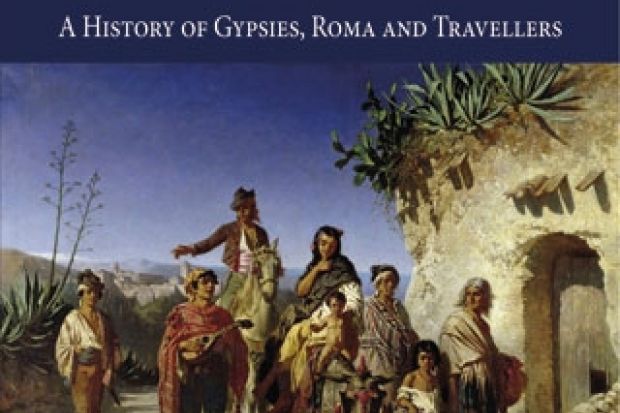I must admit that my heart sank at the sight of this book. The cover image, a 19th-century painting of an exotic, ragged-looking family travelling through a baking-hot (possibly Spanish) countryside, runs the gamut of Gypsy stereotypes from half-naked children to a Carmen-esque beauty with red flowers in her hair. It is, in short, ripe for the deconstructive treatment that has been given to such images of “othering” in work by Traveller/Roma artists such as Delaine Le Bas. The problem, of course, is that such images are precisely what everyone recognises as being “about the Gypsies”, while those that subvert cliché or offer an alternative are hard to sell.
Luckily, the book’s cover is where the stereotypes end, and despite attempting to address a huge range of eras, countries and many different Roma minority groups, Becky Taylor achieves something quite brilliant here. That said, I might at this point also take umbrage with the book’s title. Rather than being a history of Gypsies, Roma and Travellers, this is more a fascinating insight into the construction of otherness. From the shifting attitudes towards poverty and revenue seen in medieval empires, to the rise of Protestantism and nation-state building beginning in the late 17th century, and finally to modern-day approaches to race, Taylor’s book is about the ways that notions of difference have been dealt with by European powers across varying political systems.
What is particularly good is Taylor’s highlighting of the discrepancies between rulers’ edicts and legislation, and the clues she has unearthed about the realities of everyday practices. While public discourses and legislation have often been harsh and exclusionary, we cannot assume that all people connected to the terms Gypsy, Roma and Traveller would have lived their lives as marginalised victims. So, for example, while the 18th century was marked by some of the harshest laws against Gypsy minorities, there is evidence that Gypsy people in Nuremberg were trading with metal dealers and others, attesting to their position in local economies. At the same time in Hungary, some lords chose not to implement official decrees of “banishment on pain of mutilation and execution”, instead keeping Gypsy populations in situ because their work as smiths, soldiers and musicians was valued. These are important details in acknowledging the contribution that such groups have made to European societies both economically and culturally.
Nevertheless, Taylor does not shy away from detailing the devastating effects of anti-Gypsy policies and practices. Gypsy minorities were victims of slavery in feudal Wallachia and Moldavia in the late 14th century (although later in the book we learn that in 18th-century Brazil, Gypsies from Portugal were themselves slave owners). Documentation shows that torture, hangings and pogroms specifically targeted at Gypsy minorities were a horrific part of European history that no era escaped, as the loss of hundreds of thousands of Roma lives in the Holocaust attests. Thanks to the greater availability of relevant documentation at this point in the historical record, Taylor is able to offer more direct quotes from Roma people themselves, adding depth to the narrative.
Another Darkness, Another Dawn ends with a warning that contemporary right-wing attitudes and policies are producing another era of exclusion and violence across Europe. As Taylor points out, we cannot assume that the course of European history has inevitably brought progress in human rights and social cohesion along with it. Understanding the trajectory, however, may help us to recognise the entrenched and vital role that Roma minorities continue to have in European societies.
Another Darkness, Another Dawn: A History of Gypsies, Roma and Travellers
By Becky Taylor
Reaktion, 2pp, £25.00
ISBN 9781780232577
Published 24 March 2014
Register to continue
Why register?
- Registration is free and only takes a moment
- Once registered, you can read 3 articles a month
- Sign up for our newsletter
Subscribe
Or subscribe for unlimited access to:
- Unlimited access to news, views, insights & reviews
- Digital editions
- Digital access to THE’s university and college rankings analysis
Already registered or a current subscriber? Login





